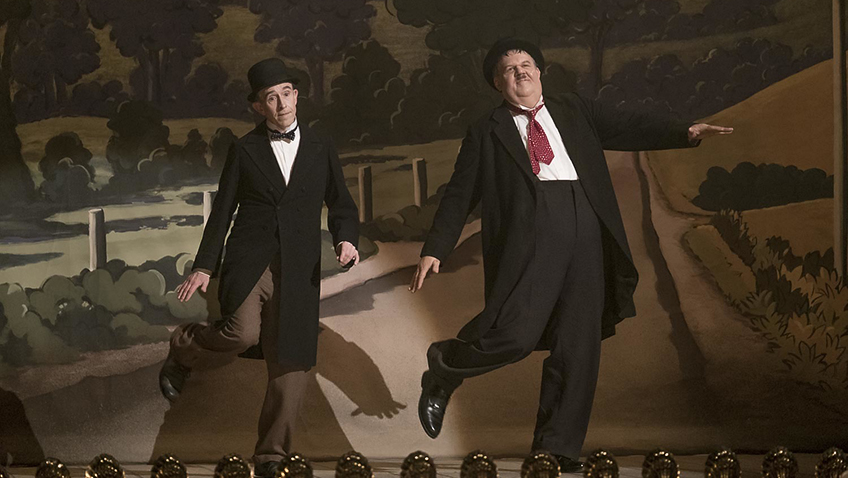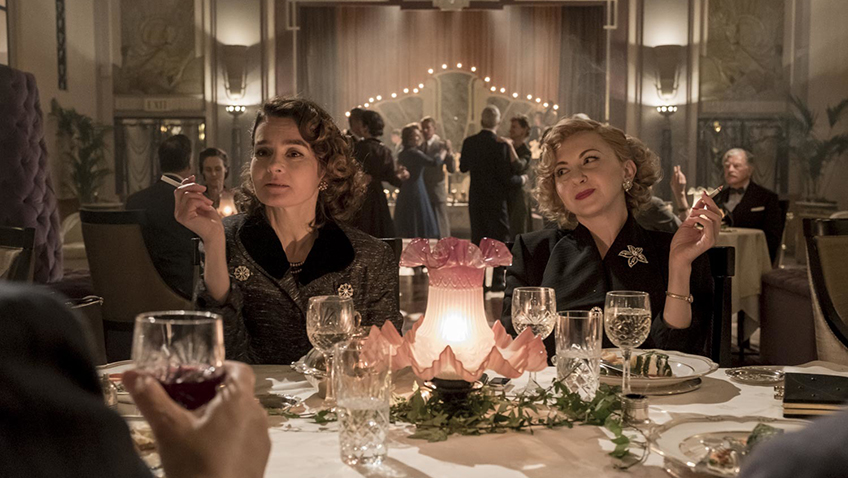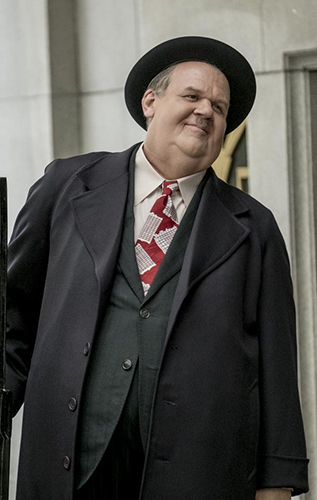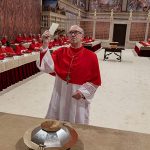Joyce Glasser reviews Stan & Ollie (January 11, 2019), Cert. PG, 97 min.
Although overlooked by the Golden Globes, let’s hope that the American and British film Academies do not judge Stan & Ollie by its director’s (Jon S. Baird), shaky record and rather celebrate this humorous and heart-warming show business biopic that is even better on a second viewing.
In 1937 chalk and cheese comedy duo Stan Laurel (Steve Coogan, Philomena, The Other Guys, In the Loop) and Oliver Hardy (John C. Reilly, Cyrus, Cedar Rapids, The Aviator) are the biggest stars in Hollywood. They are no matinee idols, but they worked hard to ensure that their perfectly-tuned comedy routines, born out of vaudeville (Laurel was Charlie Chaplin’s understudy) transferred to the big screen.
Born in the early 1890s – Laurel in Lancashire, and Hardy in Georgia, USA – the pair met in the late 1920s and, except for a damaging rift, remain more devoted to one another until death than either would care to admit. Writer Jeff Pope (Philomena) and Director Jon S. Baird (Filth) efficiently cover the two comedians’ contrasting personalities and career ambitions that feed into the contractual issue with studio boss Hal Roach (Danny Huston).
Laurel is not only the writer of the material, he is the more business minded of the two. That said, he is no more a match for Hal Roach in 1937 than he is, in the 1953, for promoter and theatre impresario Bernard Delfont (Rufus Jones, hilarious) in the UK, or Mr Miffin in London, the would-be producer of a Robin Hood spoof that the duo hope will mark their come-back.
But in 1937, their fame is not matched by their income. Laurel is aware that their competitors are now insisting on owning their own material and when Hal Roach won’t hear of it, Laurel wants to break their contract and form their own company. Hardy is torn and too consumed by money worries to break with Roach. ‘Just stay off the horses and don’t get married again,’ Laurel advises, just as Hardy announces that he has proposed to his third and last wife, ‘Lucille’ Jones (Shirley Henderson).
When Roach will not give in, Laurel approaches the head of Fox Studios, who naturally wants the two together. After this power struggle with the studio system and the partners’ differing visions, they part ways in 1937 and Hardy makes a film with a new partner, referred to (when it is) as ‘the elephant film’.
We are fast forwarded sixteen years and 5,500 miles from the sunshine and luxury of their heyday in Los Angeles to the drab and dreary boarding houses and rundown music-halls of their 1953 reunion tour of the UK. Those who saw last year’s Film Stars Don’t Die in Liverpool will be reminded of NYC/L.A. film star Gloria Grahame’s final days in English regional theatres and scruffy boarding houses, but the script and performances elevate Stan & Ollie to another level.
In 1953 Newcastle they meet the dapper, slick and slimy Delfont who is too busy promoting the next generation of comedians, like Norman Wisdom to have dinner with the exhausted arrivals. They are forced to lug their luggage up the boarding house steps like they do in one of their earlier filmed comedy sketches, only here it is not funny, but humiliating.
The duo’s biggest concern about appearing in small theatres to more than half empty houses is that they won’t make it to London where Robin Hood producer Mr Miffin is scheduled to see them dazzle adoring fans. They are also afraid of disappointing their wives with their decrepit accommodation. In 1940, Laurel married his fourth and final wife, Ida Kitaeva Raphael (a superb Nina Arianda) a highly critical former show girl who has airs above her station, but grabs the drinks from Laurel’s hand and quickly downs them to prevent him falling off the wagon.
When Laurel learns the truth about their movie project, he does not have the heart to disillusion Hardy, already humiliated by their low-status tour. The tension with all that is riding on the movie is exacerbated by the emergence of ghosts of the past. The elephant in the room, quite literally, is that elephant movie, which Laurel sees as a betrayal. For Hardy, Laurel broke the contract and abandoned him. Through the acting, we recognise that both men share the guilt for the rift that ultimately landed them in the position they are now. Moreover, their protective wives take sides and the ladies’ suspicions result in a hilarious ongoing repartee.
Meanwhile, while Delfont is a stingy and deceitful opportunist, he is not stupid, and realises that (a) most people think Laurel and Hardy are retired or dead and (b) those who do show up are laughing. He persuades the two men (although they have no choice) to do free PR, including public appearances across the country. It pays off and their venues and the audiences grow increasingly larger.
Coogan and Reilly both deserve acting nominations for their off-stage portrayals of this winning pair but particularly for their ‘on’ stage recreations of the duo’s acts. Even when they are off stage the script is continually funny and you can only regret that the Robin Hood film was not made with lines like, ‘We steal from the poor to give to the poor and that way you cut out the middleman.’
If Laurel and Hardy originally struggled to attract new audiences to their poorly attended small-town venues, Coogan and Reilly faced the challenge of making 21st century audiences laugh at 70-year-old gags. The two also have to convey the love they feel for one another, while their characters do their best to hide the depth of their affection from themselves and from one another. After Hardy dies of the heart problem that nearly cut short their tour in 1957, Laurel never performed again. Dick van Dyke, fresh from making Mary Poppins in 1964, gave the eulogy at Laurel’s funeral and Buster Keaton declared him funnier than he or Chaplin.
Coogan and Reilly’s witty banter and comic interaction is matched by that of their respective wives. The sparring between Lucile and Ida is so cleverly written and brilliantly acted by Henderson and Arianda that you have to agree with Delfont who can only comment to bemused guests: ‘Quite a double act, isn’t it?’
You can watch the film trailer here:







